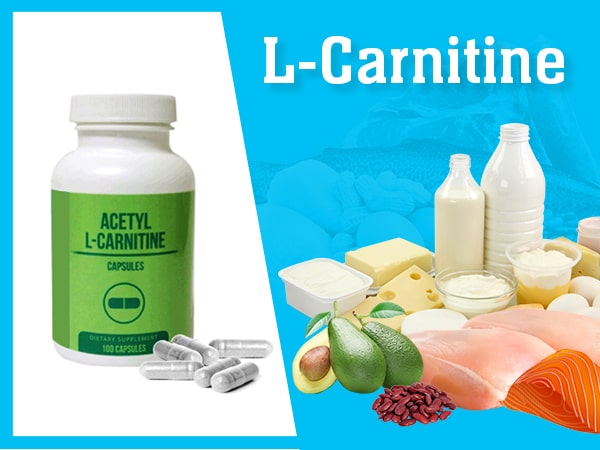
L-carnitine
L-carnitine is a chemical similar to an amino acid that is produced in the body. L-carnitine helps the body turn fat into energy. The body can convert L-carnitine to other chemicals called acetyl-L-carnitine and propionyl-L-carnitine. L-carnitine is taken by mouth to increase L-carnitine levels in people whose natural L-carnitine level is too low. Some people also use L-carnitine for conditions of the heart and blood vessels, overactive thyroid, inability to become pregnant within a year of trying to conceive (infertility), severe kidney disease, and many other conditions. However, there is no good scientific evidence to support these uses.
L-Carnitine is a compound produced by the body from lysine and methionine.
L-carnitine's Benefits
It seems to have high utility in liver diseases where it reduces ammonia levels, the symptoms of hepatic encephalopathy, and various markers of poor liver function. An improvement in sperm quality has been found with the supplementation of high doses, and improvements in male fertility have been noted in a small number of studies. It seems to help women with polycystic ovary syndrome by reducing some of the symptoms. Acetyl-L-carnitine (and possibly L-carnitine too, but studies only use ALCAR) shows efficacy in depression, though more research is needed to determine its usefulness. It seems to reduce fatigue in older adults with low muscular endurance, but its effects on athletes during physical activity are not remarkably consistent, though research supports minor improvements. L-Carnitine may slightly limit muscle damage during resistance exercise. It seems to have minor beneficial effects on blood pressure, blood glucose, insulin sensitivity, lipid profile, oxidative stress, and inflammation. Overall, it seems helpful in metabolic syndrome but not a first choice.
LC supplementation, in combination with carbohydrates, effectively elevated total carnitine content in skeletal muscle.
L-carnitine's Food Sources
Foods that provide carnitine are mainly animal products, dairy, poultry, and meat. Red meat has one of the highest concentrations.
Foods high in carnitine include:
• Beefsteak, cooked, 4 ounces, contains 56 to 162 milligrams (mg)
• Milk, 1 cup, contains 8 mg
• Chicken breast, cooked, 4 ounces, contains 3 to 5 mg
• Cheese, cheddar, 2 ounces contains 2mg
Non-animal sources include whole-wheat bread and asparagus.
L-carnitine's Side Effects
Most people tolerate L-carnitine well. However, some individuals may experience digestive side effects when taking L-carnitine. These include:
• stomach cramps
• nausea
• vomiting
• diarrhea
Using L-carnitine
Athletes: Some athletes take extra L-carnitine, believing that it will boost their athletic performance. L-carnitine availability seems to limit muscle metabolism during very high-intensity exercise.
For weight loss: As L-carnitine helps burn fatty acids for energy, many people assume that taking more of it may help them lose weight.
L-carnitine's Deficiency
Nutritional carnitine deficiencies have not been identified in healthy people without metabolic disorders, suggesting that most people can synthesize enough L-carnitine. Even strict vegetarians (vegans) show no carnitine deficiency signs, even though most dietary carnitine is derived from animal sources. Infants, particularly premature infants, are born with low L-carnitine stores, which could put them at risk of deficiency given their rapid rate of growth.




